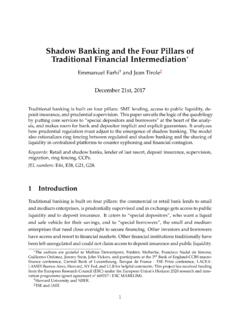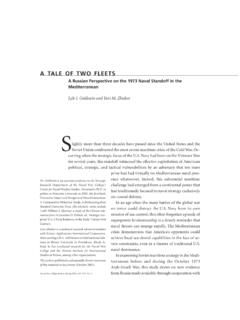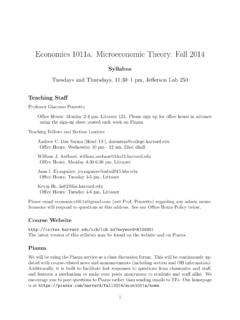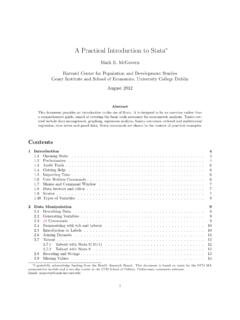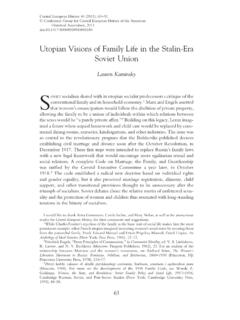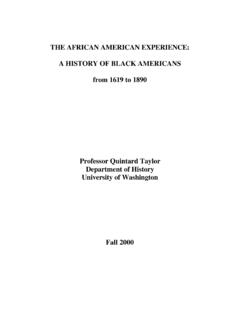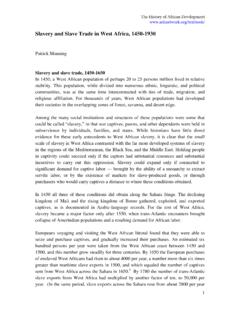Transcription of Why is Africa Poor? - Harvard University
1 Why is Africa Poor? Maddison Lecture - University of GroningenJames A. RobinsonHarvardApril 8, A. Robinson ( Harvard )Why is Africa Poor? April 8, / 26 IntroductionIntroductionAfrica is the poorest continent in the world in terms of GDPper-capita and the majority of the world s poor live in institutional explanations for this todayat the macro level: predatory and kleptocratic rule, weak states unableto enforce rules, order or provide public goods, lack of mechanisms ofnational accountability allowing rent the micro level: mechanisms for allocating land, lack of mechanismsof local accountability (chiefs), social institutions of mutual and how did institutions become antithetical to development -extractive- in Africa ?This is a fascinating question, which few people have asked(amazingly!), with a dearth of evidence, no conventional wisdom andon which reasonable people can disagree. I shall present one personalview which I believe is consistent with the facts I A.
2 Robinson ( Harvard )Why is Africa Poor? April 8, / 26 Homage to Angus Maddison 03,0006,0009,00012,00015,00018,00021,000 24,00027,00030,0001100015001600170018201 8701913195019732001 Western EuropeUnited StatesEastern EuropeLatin AmericaChinaIndiaJapanAfricaUnited KingdomInstitutional OriginsEconomic Development in Africa prior to the ScrambleExtractive Economic Institutions?There has been a long debate about whether Africa had the economicor political institutions necessary for growth in the pre-colonial believe the answer is no:1 Even in the late colonial period most Africans were engaged insubsistence activities outside of the formal was backward - absence of the wheel, plow and writingoutside of was endemic. In the 19th century various estimates suggestthat in West Africa the proportion of slaves in the population wasbetween 1/3 and 1/2 (Lovejoy, 2000).4 States tended to heavily limit the extent of private enterprise, forinstance in Asante (Wilks, 1979) and Dahomey (Law, 1977, Manning,2004).
3 5 Ownership structure and allocation of land by chiefs not conducive todevelopment (Goldstein and Udry, 2008).James A. Robinson ( Harvard )Why is Africa Poor? April 8, / 26 Working for SubsistenceSource: George Dalton (1976) Review: An Economic History of West Africa by Hopkins, african Economic History, 1, OriginsPolitical Development in Africa prior to the ScrambleExtractive Political Institutions?Most crucial aspect is the relative lack of political centralizationcompared to can been seen from Louis Putterman s state antiquity indexwhich measures the length of period which people have lived undercentralized importance of this for development can be seen from case-studyevidence (not a coincidence that only centralized states like Asante,Buganda, Dahomey and Ethiopia built real roads).Also evidence from the Standard Cross Cultural Sample show strongpositive correlations between political centralization, public goods anddevelopment A.
4 Robinson ( Harvard )Why is Africa Poor? April 8, / of State Antiquity Year Index of State Antiquity (Bockstette, Chanda and Putterman (2002) EuropeAsiaMiddle EastSub-Saharan AfricaLatin America and CaribbeanNorth AmericaOceaniaInstitutional OriginsWhen did african Institutions Become RelativelyExtractive?We don t know the answer to this. Aksum had economic and politicalinstitutions on a par with the Eastern Roman here is one way of seeing that at the start of the early modernperiod economic institutions were not good: Start with a famousparadox:why, if population density was low in Africa so that labor productivitywould have been high, were Africans exported as slaves at huge cost interms of fatality?One answer could be that other factors made agricultural productivityvery low irrespective of the factor proportions (Diamond, Sachs).An alternative: though it may have been true that the potentialphysical productivity of labor would have been high because of thefactor proportions, theappropriableproduct would have been muchlower because institutions were A.)
5 Robinson ( Harvard )Why is Africa Poor? April 8, / 26 Institutional OriginsCouldn t african Technologies rather than being Ine cienthave been Adapted to Di erent Circumstances?I don t think so. Here is one previous generation of scholars argued that the lack of the use ofwheeled transportation in Africa was because it was inappropriate ,couldn t use wheeled transportation because of lack of draft animalsand forest di cult to cut simple social savings calculations show that early colonial railways(and other forms of wheeled transportation) generated signi cantsocial savings (in the order or 5-10% of GDP) and railways generatedmassive social rates of return (up to 100% in the Nigerian case).So head porterage wasnotan e cient way of transportation givenAfrica s A. Robinson ( Harvard )Why is Africa Poor? April 8, / 26 Source: Chaves, Isaias, Stanley L. Engerman and James A. Robinson (2012) Reinventing the Wheel: The Economic Benefits of Wheeled Transportation in Early Colonial British West Africa , Using Railways rather than Head Porters generated Significant Social Savings And Massive Social Rates of Return Institutional DynamicsA Vicious Circle of Extractive InstitutionsOne economic and political institutions are extractive this can easilylead to a vicious economic institutions lead to slave exports.
6 The dynamicsthis set up perpetuated and even intensi ed extractive made slavery more intense in Africa and human rights destroyed states and created others which were based on rent( slave ) created political A. Robinson ( Harvard )Why is Africa Poor? April 8, / 26 Source: Nathan Nunn"The Long Term Effects of Africa 's slave Trades," Quarterly Journal of Economics, Vol. 123, No. 1, February 2008, pp. 139-176. slave Exports are negatively correlated with Pre-Colonial Political Centralization Sources: slave data from , data on shipments of gunpowderFrom Joseph Inikori (1977) The Import of Firearms into West Africa , 1751-1807, Journal of african History, 18, embarked bound for the Americas and BritishShipments of Gunpowder to West Africa , 1750-1807 SlavesPounds of gunpowderInstitutional DynamicsFrom the slave trade to ColonialismThe institutional consequences of the slave trade made african evenmore vulnerable to European are at least three views on the impact of colonialism1 Too short to in uence anything (Je rey Herbst)2 The Eccentric Consensus: colonial o cials and academics such asPeter Bauer and Niall Ferguson agree with Marxists like Lenin and BillWarren sImperialism: Pioneer of Capitalismthat colonialismstimulated economic growth in Africa .
7 It brought modern institutions,technologies and organizational forms and Europeans would not havebothered understanding what caused tropical diseases if they had notbeen intent on important source of african underdevelopment - the locusclassicus of which is Walter Rodney sHow Europe A. Robinson ( Harvard )Why is Africa Poor? April 8, / 26 Institutional DynamicsInstitutional Legacies of ColonialismPositive ArgumentsEuropeans ended slavery, introducing modern legal systems andmethods of administration and eventually constructing moderndemocratic institutions improved, not just because slavery wasabolished but also because Europeans made property rights secureand brought to an end con icts within african society (which theyhad previously heavily exacerbated by generously supplying anyonewho could pay with rearms, Inikori, 1977).They also started schools where there were A. Robinson ( Harvard )Why is Africa Poor?
8 April 8, / 26 Institutional DynamicsInstitutional LegaciesNegative Arguments1 Perverse e ects of particular colonial institutions, such as agriculturalmarketing boards (Bates, 1981).2 Colonialism created an arbitrary state system which has led topolitical con icts, instability and dictatorship (Engelbert, 2000).3 Colonial authorities created gate-keeper states which were onlyinterested in ruling rather than in developing the countries and thesehave left a path dependent legacy (Cooper, 2002).4 The political authoritarianism of the colonial state is a direct sourceof the authoritarianism that has plagued Africa (Young, 1994) (Smithand Mugabe).5 Structure of colonial indirect rule warped local institutions ofaccountability making them more autocratic (Mamdani, 1996).6 Colonialism created and shaped identities and cleavages indysfunctional ways (Hutu and Tutsi).James A. Robinson ( Harvard )Why is Africa Poor?
9 April 8, / 26 Institutional DynamicsEconomic Development in Africa during and broad pattern of GDP per-capita is that on average thisincreased during colonialism (in the places for which there is reliabledata) relative to the base year of around brought technology, such as railways and miningtechniques and integrated their colonies more fully into world tradetaking advantage of existing patterns of comparative , the rates of economic growth were extremely incomplete data also suggests that stature and lifeexpectancy improved as did literacy and educational attainment fromvery low bases (Prados de la Escosura, 2011).After independence much of this went into reverse (see slide), evenincreasing height (Cogneau and Rouanet (2011) and Austin, Batenand Moradi (2011) on Ghana).James A. Robinson ( Harvard )Why is Africa Poor? April 8, / 26 GDP Per-Capita in Sub-Saharan Africa , 1870-2008 Source: Angus Maddison Primary School Enrollment Rate, 1870-1940 Source: Benavot, Aaron and Phyllis Riddle (1988) "The expansion of primary education, 1870--1940: Trends and Issues," Sociology of Education, 66 (3), 191--120.
10 Life Expectancy at Birth Source: Riley, (2005) "Estimates of Regional and Global Life Expectancy, 1800-2001", Population and Development Review, 31(3), 537-543. Institutional DynamicsLiving Standards for AfricansEven if there may have been a correlation between the colonial periodand improvements in average living standards this does not imply thatAfricans incomes increased with can easily be seen from a simple calculation in the cases whereEuropeans expropriated large amounts of land (Angola, Kenya,Mozambique, Namibia, South Africa , Zimbabwe).James A. Robinson ( Harvard )Why is Africa Poor? April 8, / 26 Institutional DynamicsEconomic Consequences of the Natives Land Act of 1913 LetLbe the total stock of land andNbe the black living standards of Africans before land expropriationandwathe level (improbably) that Africans are paid the value of theirmarginal to land expropriation we havewb= AN1 L 1(1)whereAis total factor productivity and 0< <1 is a the Native Land Act of 1913 allocated 7% of land to Africans wehave that after land expropriation african living standards are given bywa= A(( )N)1 L 1(2)Now divide (2) by (1) to derivewawb=( )1 James A.


